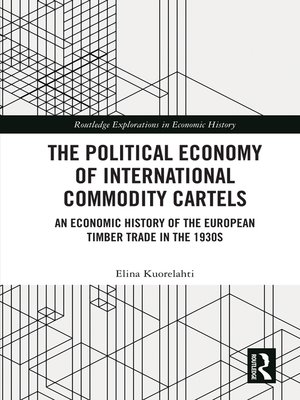The Political Economy of International Commodity Cartels
ebook ∣ An Economic History of the European Timber Trade in the 1930s · Routledge Explorations in Economic History
By Elina Kuorelahti

Sign up to save your library
With an OverDrive account, you can save your favorite libraries for at-a-glance information about availability. Find out more about OverDrive accounts.
Find this title in Libby, the library reading app by OverDrive.



Search for a digital library with this title
Title found at these libraries:
| Library Name | Distance |
|---|---|
| Loading... |
The Political Economy of International Commodity Cartels examines how international commodity cartels in the 1930s were impacted not only by commercial rivalry, but also by international trade political and diplomatic concerns.
This work presents the rise and decline of the European Timber Exporters' Convention (ETEC) and analyses how firms navigated through the cartel game under increasing international competition, pressures from the national governments, and the interventionist endeavours of the League of Nations. Cartels are often associated with, in the standard economic interpretation, business collusion. However, in using vast archive sources and historical methodology, the chapters in this book shed light onto how international relations shaped cartels. The rise of British protectionism, the emergence of the Soviet Union as an industrial power, and the economic rapprochement of the League of Nations in the early 1930s created a wave of political and diplomatic challenges in the timber trading countries and affected cartelisation. Timber firms in the biggest producer countries—Finland and Sweden—were uninterested in international cartel collaboration, but under pressure joined the ETEC nevertheless.
This book makes a strong contribution to the fields of business history and cartel studies. It is an essential read for economic historians interested in how political pressure shaped international cartels and how cartels became avenues of diplomacy.







